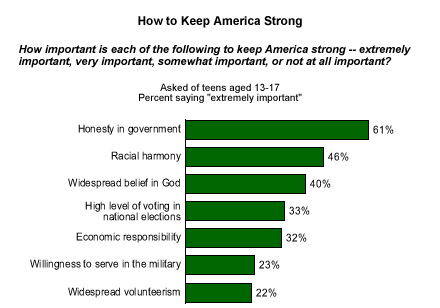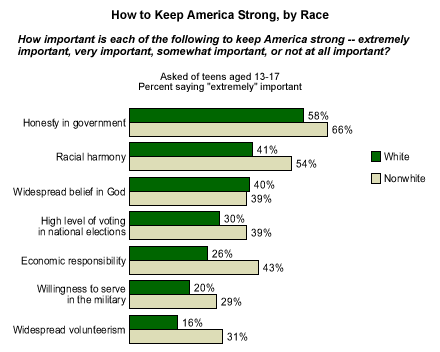Discussions about the strengths of American democracy are a staple of high school civics classes. But with the Sept. 11 terrorist attacks, the war in Afghanistan, and now the conflict in Iraq, teens are probably more likely to engage in discussions about America's values and priorities outside the classroom now than they were a few years ago.
A recent Gallup Youth Survey* asked teens how important a list of seven concepts or behaviors are to keeping America strong. Just like adults -- who were asked the same question in September 2003 -- American teens are most likely to say that having a government that can be trusted to be honest with its citizens is an important way to keep the country strong. A majority of teens (61%) feel that "honesty in government" is "extremely" important in that regard -- the highest percentage of any of the items tested.

All other items were rated "extremely important" by considerably fewer teens. Next on the list was racial harmony, for which 46% rate it as "extremely" important to keeping America strong.
Religious Participation
Four in 10 teens (40%) consider "widespread belief in God" to be extremely important to keeping America strong, reflecting the consistently high level of religiosity Gallup has found among American teens since the Youth Survey began in 1977.
In keeping with the Gallup finding that women tend to be more religious than men, girls are somewhat more likely than boys to say that a widespread belief in God is extremely important to keeping America strong, 45% compared to 35%. Also, not surprisingly, 65% of teens who feel that a widespread belief in God is extremely important to the strength of America say they attend church or synagogue weekly, versus just 22% of those who do not attend.
Political and Military Participation
Only 33% of teens feel that voting in national elections is extremely important to keeping America strong. Although some of these teens will be eligible to vote in next year's presidential election, the historically low voting patterns of young Americans suggest that few of the 18-year-olds who are newly empowered to participate in the political process will actually go to the polls. In a recent Gallup survey, only 39% of 18- to 29-year-olds said they "always vote," compared with 59% of those aged 30 and older. (See "Gallup Poll Assesses Views of Young Americans" in Related Items.)
Interestingly, even during a time of war, relatively few teens (23%) feel that a willingness to serve in the military is extremely important to keeping the country strong. This may reflect the fact that teens are approaching the age when they may be called upon for military service, and may feel some apprehension about that prospect.
Racial Differences
White and nonwhite teens respond identically to only one of the seven items tested -- 40% of white teens and 39% of nonwhite teens agree that a widespread belief in God is extremely important to America's strength. Not surprisingly, racial harmony is more top-of-mind for nonwhite teens -- 54% feel that it is "extremely" important, compared to 41% of white teens.
But nonwhite teens are much more likely to say that economic responsibility and volunteerism are key to keeping America strong. Almost twice as many nonwhite teenagers (43%) as white teenagers (26%) feel that economic responsibility on the part of individuals is extremely important to keeping America strong. Since poverty disproportionately affects minority populations, teens in this group may feel particularly reliant on the country's economic wellbeing. Perhaps for similar reasons, nonwhite teens feel more strongly than white teens that widespread volunteerism -- the proclivity to spend time helping those less fortunate -- is extremely important to America's strength, 31% vs. 16%.

Bottom Line
This audit of tomorrow's adults provides many reasons for optimism, particularly teens' high interest in keeping government honest. But two areas of concern stand out -- teens' reluctance to say that a high level of voting is important for America, and the relatively low priority teens put on a willingness to serve in the military as a way of keeping America strong. Obviously, participation in the political process is vital to maintaining a successful democracy. And with the war on terrorism giving rise to increased domestic and international operations and responsibilities, military planners may need to improve their outreach strategies in order to fill a growing need for more men and women to join the armed services.
*The Gallup Youth Survey is conducted via an Internet methodology provided by Knowledge Networks, using an online research panel that is designed to be representative of the entire U.S. population. The current questionnaire was completed by 517 respondents, aged 13 to 17, between Aug. 1 and Aug. 29, 2003. For results based on the total sample, one can say with 95% confidence that the maximum margin of sampling error is ±5 percentage points.